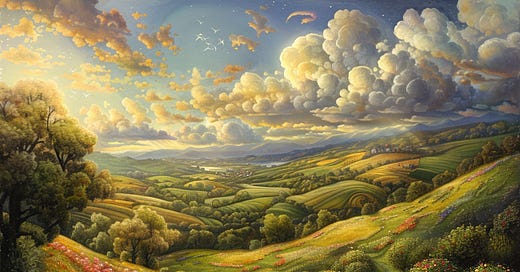Are the nihilists/existentialists like Schopenhauer, Nietzche, and Camus right?
Is Schopenhear right that "life has no intrinsic worth, but is kept in motion merely by desire and illusion"?
Is Nietzche right that "to live is to suffer, to survive is to find some meaning in the suffering"?
Is Camus right that life "implies a total absence of hope (which has nothing to do with despair), a continual rejection (which must not be confused with renunciation), and a conscious dissatisfaction (which must not be compared to immature unrest)"?
Somehow I am supposed to find their ideas of heroically raging against this reality as fulfilling. But I deny they have finally tapped into the one true, baseline reality, but rather a type of reality.
In The Listening Society by Hanzi Freinacht, the author proposes this modern philosophy is based on the idea you can't achieve prolonged periods of higher subjective states. The philosophers are, just as Nietzche in Beyond Good and Evil argues all philosophers do, simply masking their inherent prejudices with great intelligence and reason. But with proper spiritual practice, you can actually live in meaningful higher states of happiness. He models subjective mental states as follows:
Lower states
Hell 1
Horrific
Tortured
Tormented 4
Medium states
Very uneasy 5
Uneasy, uncomfortable
Somewhat uneasy, okay, full of small faults
Satisfied, well
Good, lively
Joyous, full of light, invigorated 10 10
High states
Vast grand open 11
Blissful, saintly
Enlightened, spiritual unity 13
Hanzi argues incorporating the insights of higher or lower states creates an important kind of wisdom and depth. Existentialists offer a coherent integration of lower states acknowledging the real, unavoidable suffering in this world. But, the problem is they do not integrate or explore higher states of blissful unity and pretend their nihilist perspective is the one true reality uncovering the fundamental delusion of life and happiness. But after years of staring into the abyss, where can I begin to experience and integrate these higher states?
Recently I took a lovely trip in nature with my best friend. As I sat on a bench overlooking a beautiful, quiet grass field, I felt a deep peace I can best describe as a sense of abundance. In lower states, you are worried about your own life and future. But in this space of abundance and beauty, my attention was drawn towards the larger world. The world made sense. It was a sense everyone was just like me and struggled with the same challenges of focusing on alleviating their own suffering because of a deep seated anxiety about themselves and the future. But here from a higher perspective, there was a real moment of peace above the noise. An achievable sense of safety and abundance for those who were willing to poke their head above the trees. I worried that safety and abundance would create a sense of apathy and complacency, but here I felt a drive to help the world.
Yesterday on a simple hike in nature with the wind whispering on my skin, I felt something similar. It put things in perspective, which is to say the sense of beauty and abundance affected the kinds of things I would consider. Even once I returned home, I still possessed a sense that I was ok which caused an optimistic shift in my attention towards a better life for myself and the world. This article is a declaration I wish to cultivate and live in this state.
Here are my top ideas for how:
More nature, more hikes or sitting on grass every other day, and longer trips to nature once a month
Meditation courses online to be explored in my room
Go to events at the Zen Center and with the Experimental Church community
Record the cause and effect of activities on my sense of abundance
Overall, I believe a better worldview and perspective on life is not only my most important problem, but the world’s.



